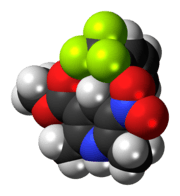Bay K8644
 | |
 | |
| Names | |
|---|---|
| IUPAC name
Methyl 2,6-dimethyl-5-nitro-4-[2-(trifluoromethyl)phenyl]-1,4-dihydropyridine-3-carboxylate | |
| Identifiers | |
| 71145-03-4 | |
| 3D model (Jmol) | Interactive image |
| ChEBI | CHEBI:34555 |
| ChEMBL | ChEMBL513599 |
| ChemSpider | 2213 |
| ECHA InfoCard | 100.163.930 |
| 2511 | |
| PubChem | 2303 |
| |
| |
| Properties | |
| C16H15F3N2O4 | |
| Molar mass | 356.30 g·mol−1 |
| Insoluble | |
| Solubility in other solvents | DMSO: 184 mg/mL; methanol and ethanol: 63 mg/mL |
| Hazards | |
| EU classification (DSD) |
Xi |
| R-phrases | R36/38 |
| S-phrases | S26 S36 |
| Except where otherwise noted, data are given for materials in their standard state (at 25 °C [77 °F], 100 kPa). | |
| | |
| Infobox references | |
Bay K8644 is a chemical compound that functions as a calcium channel agonist. Bay K8644 is used primarily as a biochemical research tool for this effect.[2] It is a structural analog of nifedipine with positive inotropic activity, and as an aromatic it is highly lipid soluble.
Mechanism of Action
Bay K8644 targets Voltage-sensitive dihydropyridine (DHP) Calcium Channels (L-Type). It is the first positive inotropic agent shown to act specifically and directly on calcium channels.[3]
References
- ↑ (±)-Bay K8644 at Sigma-Aldrich
- ↑ Bay K8644 at PubChem
- ↑ Thomas, G; Chung, M; Cohen, CJ (January 1985). "A dihydropyridine (Bay k 8644) that enhances calcium currents in guinea pig and calf myocardial cells. A new type of positive inotropic agent.". Circ Res. PMID 2578336.
This article is issued from Wikipedia - version of the 11/7/2016. The text is available under the Creative Commons Attribution/Share Alike but additional terms may apply for the media files.